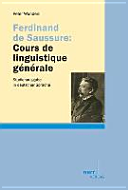Quelle: Cours de linguistique générale (1916), p. 112
Kontext: The characteristic role of language with respect to thought is not to create a material phonic means for expressing ideas but to serve as a link between thought and sound, under conditions that of necessity bring about the reciprocal delimitations of units. Thought, chaotic by nature, has to become ordered in the process of its decomposition. Neither are thoughts given material form nor are sounds transformed into mental entities; the somewhat mysterious fact is rather that "thought-sound" implies division, and that language works out its units while taking shape between two shapeless masses. Visualize the air in contact with a sheet of water; if the atmospheric pressure changes, the surface of the water will be broken up into a series of divisions, waves; the waves resemble the union or coupling of thought with phonic substance.

